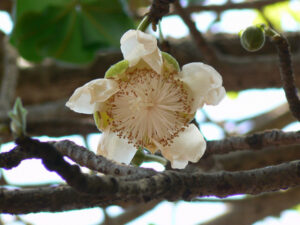Is the Baobab Fruit the King of All Superfoods?

It’s hard to pronounce, but not so hard to sell – the baobab fruit is a nutritionally-dense food we all might want to consider adding to our dietary lifestyles. The little-known exotic fruit is set to become the next big superfood, and it truly deserves all the credit it gets. In Africa, the baobab fruit has been harvested for centuries for its medicinal properties, and now it’s available to us.
The baobab fruit derives from a tree that is native to mainland Africa, Madagascar, Australia and the Arabian peninsula. The tree has been dubbed the “monkey bread tree”, the “tree of life”, the “bottle tree” and the “upside down tree”, among others. The fruit is where the magic lies. The baobab fruit looks a lot like a small coconut, with a hard outer shell. It is about 7 inches long and weighs about three pounds. Inside is baobab pulp, which is naturally dehydrated.
Unfortunately, it is very rare to find the whole baobab fruit in the U.S. Still, there is a great alternative and that is baobab fruit powder. The great thing about baobab fruit powder is that it is basically identical in flavor and nutrients to fresh baobab fruit pulp. You see, the baobab fruit pulp is dry, almost like coconut pulp. In order to “make” baobab fruit powder, you just need to remove the seeds from the pulp and crush it into a fine powder. No heat is necessary at all, so it is a very natural process, that retains the flavor and nutrients. The powder tastes nearly identical to the whole fruit itself. It has a tropical, tart flavor. Think of it like a mango, but more sour.
The baobab fruit contains 6-times more antioxidants than blueberries, 6-times more vitamin C than oranges, 6-times more potassium than bananas and 2-times more calcium than milk. It is also packed with B vitamins, magnesium, iron and phosphorus. It is the king of antioxidants, even outdoing the highly-touted acai fruit, an antioxidant powerhouse.
Because of its vitamin C content, the baobab fruit helps to form collagen and elastin, structural proteins that support the skin and give it elasticity. Vitamin C also helps to burn fat and thus lead to weight loss. It also treats heart disease and prevents the development of varicose veins.
Scientists from Oxford Brookes University found that baobab can help to reduce the effects of type 2 diabetes. A rich source of polyphenols, the baobab fruit helps to lower the rate at which sugar is released into the bloodstream. In another study, baobab extract showed protective effects against liver damage.
Beyond its nutritional benefits, the baobab fruit is doing social good in Africa, providing an economic boost for growers in Africa.
You can purchase the baobab fruit is powdered form. Organic Burst, Baobab Foods and Limitless Food provide pure 100 percent baobab fruit powders you can trust are as close to the real deal you can get in your kitchen.
Related on Organic Authority
Superfood Focus: Spring Green Peas
The Ultimate Superfood Iced Tea Recipe
7 Seasonal Superfood Recipes to Cook During Fall and Winter
Photo Credit: Dinesh Valke

